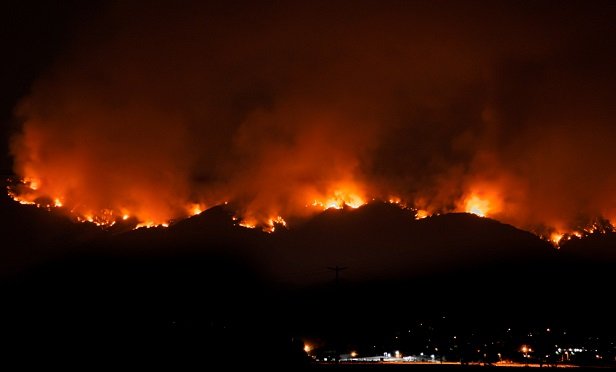 Preliminary estimates of the damages from insured losses attributed to the Camp and Woolsey fires in California range from $9 billion to $13 billion, according to RMS. (Photo: Shutterstock)
Preliminary estimates of the damages from insured losses attributed to the Camp and Woolsey fires in California range from $9 billion to $13 billion, according to RMS. (Photo: Shutterstock)
During a wildfire, innumerable toxic chemicals, poisonous gases, heavy metals and other toxins are generated by the burning materials, household products and vegetation. These contaminants fill the air, become part of the ash, and are extremely dangerous to your health if they are inhaled or come in contact with your skin. Individuals who need to enter an area affected by fire or smoke should consider the following safety tips:
|- Avoid breathing air contaminated by smoke odor and minimize your exposure to contaminated areas.
- If you need to enter a smoke-damaged structure, wear proper personal protective equipment (PPE), including a proper fitting respirator with a P-100 HEPA filter designed to filter vapor or gasses (not a dust mask).
- Persons with heart or lung disease should consult their physician before using a mask during post-fire cleanup.
- Avoid handling or coming in direct skin contact with items or materials affected by smoke, soot or ash. If you need to retrieve items damaged by smoke, wear proper PPE such as coveralls, eye protection, gloves, proper foot wear, hardhat, etc.
- Avoid getting ash into the air as much as possible. Do not use leaf blowers or take other actions that will put ash into the air.
- Avoid using shop vacuums and other common vacuum cleaners. These do not filter out small particles, but blow them out the exhaust into the air where they can be inhaled.
- Do not allow children or pets to enter areas that have smoke odor, ash or soot. If children or pets get soot or ash on their skin or hair, wash them immediately with mild soap and warm water.
- If you anticipate that you will need to be inside a building or area affected by smoke, attempt to ventilate the area by opening windows or doors and minimize your exposure as much as possible.
- Have an environmental testing laboratory test for Volatile Organic Compounds (VOCs) and particulates to determine what types and concentrations of toxins may be present.
- Do not eat or drink anything that has signs of heat or smoke damage. When in doubt, throw it out.
- If you experience any adverse health symptoms from exposure to smoke or soot, seek medical attention immediately.
- If you need to be in an enclosed space that has a smoke odor, such as an office, home or building, try to have the air cleaned or filtered. This can be done by renting or purchasing an "air scrubber" with a HEPA (high-efficiency particulate air) filter or other type of filter designed to remove ultra-fine particulate matter.
Taking precautions can help protect insurance adjusters, homeowners, renters and restoration contractors and prevent them from becoming further casualties of a wildfire.
Recommended For You
Want to continue reading?
Become a Free PropertyCasualty360 Digital Reader
Your access to unlimited PropertyCasualty360 content isn’t changing.
Once you are an ALM digital member, you’ll receive:
- Breaking insurance news and analysis, on-site and via our newsletters and custom alerts
- Weekly Insurance Speak podcast featuring exclusive interviews with industry leaders
- Educational webcasts, white papers, and ebooks from industry thought leaders
- Critical converage of the employee benefits and financial advisory markets on our other ALM sites, BenefitsPRO and ThinkAdvisor
Already have an account? Sign In Now
© 2025 ALM Global, LLC, All Rights Reserved. Request academic re-use from www.copyright.com. All other uses, submit a request to [email protected]. For more information visit Asset & Logo Licensing.





